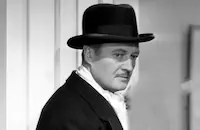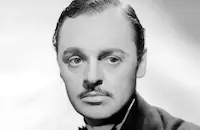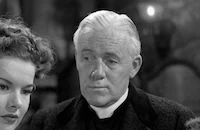Wolf of New York
Cast & Crew
William Mcgann
Edmund Lowe
Rose Hobart
James Stephenson
Jerome Cowan
William Demarest
Film Details
Technical Specs

Synopsis
Gangster Hiram Rogers, who deals in unlisted, often stolen securities, orders henchman Owney McGill to rob the Midland Insurance Company. McGill and two others stage the robbery, but McGill is caught by the police. Rogers calls Christopher Faulkner, a brilliant, cynical young lawyer who is more interested in money and prestige than ethics. Assuming that Chris will employ one of his usual tricks, District Attorney Cosgrove despairs of winning the case, which will be one of many he has lost to Chris. Chris does fool the jury and wins the case, after which Peggy Nolan, Cosgrove's secretary as well as Chris's former girl friend, meets with Chris and asks him to free himself from his underworld connections. Chris scoffs at her request, and is soon caught up in Rogers' affairs even more when Police Inspector Nolan, Peggy's father, is murdered while investigating Rogers' shady business dealings. The chief suspect is young Frankie Mason, a former convict whom Chris helped go straight by getting him a job as Rogers' office assistant. Frankie is innocent, which Chris is able to confirm when he finds Sylvester Duncan, an alcoholic undertaker with whom Frankie was drinking on the night of the murder. Unfortunately, Chris tries to employ his grandstanding tactics by calling Duncan as a surprise witness on the last day of the trial, and Duncan is murdered before he can appear. Chris desperately pleads with the jury to believe in Frankie's innocence, but he is convicted and sentenced to die. Two months later, after Frankie's execution, his name is cleared after Duncan's killer confesses, and Cosgrove is forced to resign. Peggy convinces the Governor that Chris is the perfect choice to be Cosgrove's successor, for he has renounced his former connections and is a much humbler and wiser man. She then persuades Chris to accept the job by telling him that he now has the opportunity to catch her father's killer. After his appointment, Chris purges the town of all its gambling establishments and other shady places. One day, a man named Herbert Jenkins, who was apprehended while passing a stolen bond, is brought in to Chris, and it becomes apparent that he may be the key to cracking the case. He is murdered before he can reveal much, but Chris finds a slip of paper with the name "Hugo Stout" on it in his pocket. Chris checks with the FBI, then authorities in England, and discovers that Stout is a notorious English thief and murderer. While Chris, Peggy and Chris's assistant, Bill Ennis, are investigating the link between Jenkins, Rogers and Stout, Peggy and Bill are kidnapped and taken to Rogers' house. There it is revealed that Rogers is Stout. Rogers is just about to kill Peggy and Bill and make his getaway when Chris and the police arrive. Rogers is convicted of arranging Nolan's murder, and Chris and Peggy celebrate their success by getting married.

Director
William Mcgann
Cast

Edmund Lowe

Rose Hobart

James Stephenson

Jerome Cowan

William Demarest
Maurice Murphy

Charles D. Brown
Edward Gargan
Andrew Tombes
Ben Welden
Ann Baldwin

Roy Gordon
Crew
Charles Belden
Arnold Belgard
George Blair
Ned Davenport
Cy Feuer
Lionel Houser
Gordon Kahn
Reggie Lanning
John Victor Mackay
Ernest Nims
Robert North
Adele Palmer
Murray Seldeen
Leslie T. White
Al Wilson

Film Details
Technical Specs

Quotes
Trivia
Notes
The film was called The Wolf of Wall Street in the Motion Picture Herald "In the Cutting Room " review. According to a news item in Hollywood Reporter, Republic had just purchased "an original" from Louis Weitzenkorn inspired by the trial of underworld figure Jimmy Hines. Weitzenkorn was not credited onscreen, in Screen Achievements Bulletin or in reviews and it is possible that the studio purchased the title but never used any of the original story. The trial of Hines, the result of work by New York special prosecutor, then district attorney (and later governor and presidential candidate) Thomas E. Dewey, was in the news frequently from 1938 through 1940. Though gambling and corruption were issues raised at Hines' trial, the film Wolf of New York has little more than a passing similarity to the case.












